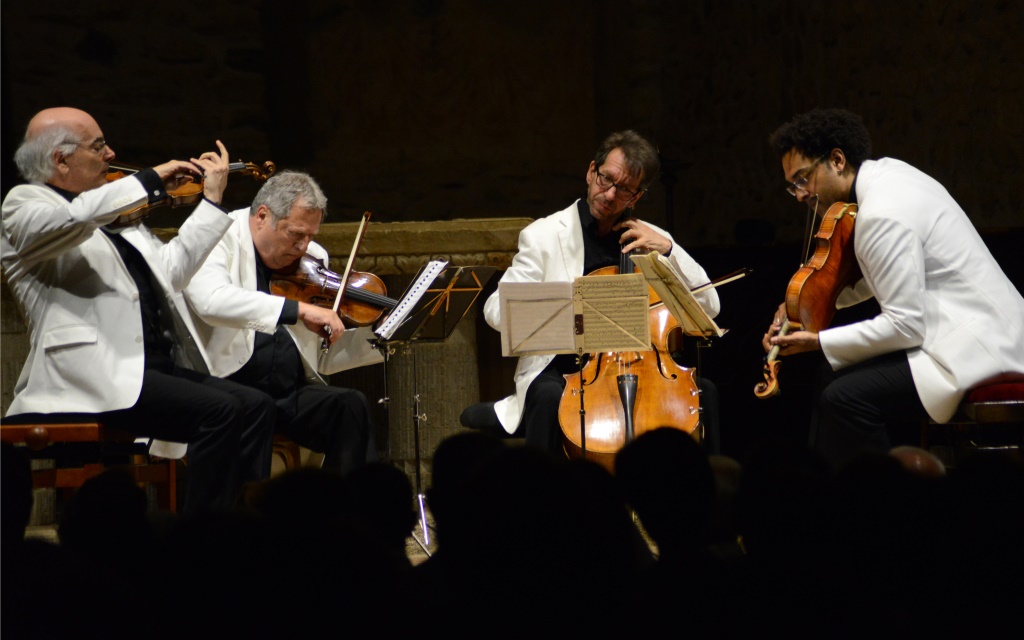The Greatest Quartet Ever Composed?
The FAQ blasts off with Beethoven, plus Haydn and Barber.
The Fine Arts Quartet (violinists Ralph Evans and Efim Boico, cellist Robert Cohen and violist Juan-Miguel Hernandez) will perform at the UW-Milwaukee Zelazzo Center this Sunday afternoon. They are nearing the end of their extraordinary, 55-year relationship as quartet-in-residence at the University of Wisconsin-Milwaukee.
The concert features perhaps the greatest quartet by the “father” of the string quartet — Joseph Haydn, and the quartet acclaimed as the greatest ever — by Ludwig van Beethoven.
Free of court obligations at the Esterházy estate and recognized in Vienna and London – indeed, around Europe – as the greatest living composer, Haydn composed his final series of quartets in 1797. His String Quartet in B flat major, Op.76, No.4 (“Sunrise”) is widely recognized as his greatest. Madison-based musicologist Kai Christiansen describes the impressionistic opening of the quartet:
The first movement begins with the sustained glow of a single, soft chord over which a solo violin slowly traces the rising sun. Several ‘introductory’ measures fuel this growing dawn until the first full-fledged theme bursts like blinding light, the sun fully emerged. To emphasize this transition, Haydn does it twice in the exposition, the second time letting the sun temporarily set by inverting the theme, the cello playing it upside down, followed by a second theme of ever more dazzling light.
Christiansen continues his eloquent description of the quartet. “The Adagio is a kind of holy hymn, a delicate supplication tinged with a mysterious sorrow. It is not hard to imagine this as a somber sunset, a counterweight to the ebullience of the first movement.” Movements suggesting a German waltz and an English folk song end the work.
Beethoven‘s String Quartet No. 14 in C-sharp minor, Op. 131 will crown the day. Full of the surprises and innovations of Beethoven’s “late period”, the quartet has seven, rather than four movements.
The Quartet will be played without breaks. Cohen views the work as a single movement. “You won’t even notice the movements. One (movement) has four to five sections within it. It’s all a process of building the entire architecture of the music.” How does the Fine Arts Quartet pace itself in such a work? “Beethoven decides how this whole thing is going to work,” Cohen adds. “We just follow every detail in the score…(The result is ) monumental, extraordinary and challenging. It challenges expectations of what music can be like. (This is) modern music hundreds of years before its time.”
We rarely hear the Barber Adagio in its original context. The dark harmonies and violent, disjunct themes of the first movement suggest some cataclysm. The adagio was designed as the antidote to the first movement. Critic Melvin Berger describes the familiar second movement: “Starting with the utmost calmness and tranquility, Barber carries the theme to an intense, exciting climax, with each instrument straining at the top of each range.” The quartet ends quickly after that emotional high.
This selection of works offer a fitting platform for the Fine Arts Quartet to show its transcendent and unique interpretations of some of the greatest chamber literature. We have been fortunate to enjoy an eight concert season from one of the great internationally renowned quartets for so many years.
The Sunday, October 8th concert begins at 3:00 p.m. and will be preceded by a pre-talk at 2:00 p.m. Tickets are free for the series, but seating is assigned. Tickets may be reserved on-line at the UWM Peck School of the Arts box office or at 414-229-4308. The Zelazo Center is located at 2419 E. Kenwood Blvd. Parking is available in the Zelazo Center lot, to the south of the building, and in the Union parking garage across Kenwood Boulevard.
The Fine Arts Quartet will end its residency at UW-Milwaukee with two concerts in early 2018: January 27 and 28.
Preview
-
Prometheus Trio Performs Music By Milwaukee Native Daron Hagen
 Feb 11th, 2026 by Michael Barndt
Feb 11th, 2026 by Michael Barndt
-
A Rebellion Against Valentine’s Day
 Feb 7th, 2026 by Michael Barndt
Feb 7th, 2026 by Michael Barndt
-
Fun With Baroque Music
 Jan 22nd, 2026 by Michael Barndt
Jan 22nd, 2026 by Michael Barndt






















I was at this performance, and it was amazing. I received added enjoyment from having heard Juan Miguel Hernandez speak at Michael Barndt’s (the author of this article) Listening To Music session about the viola a few days beforehand.